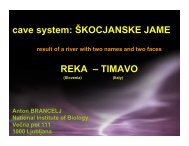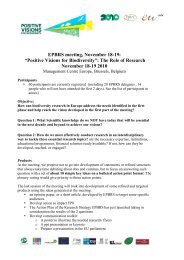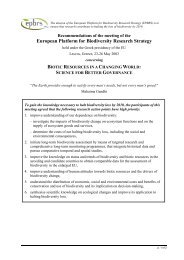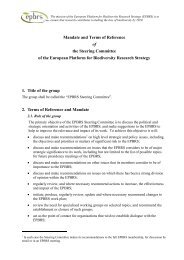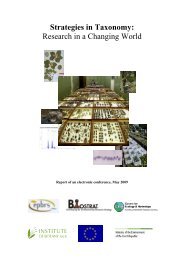Evaluation of the effectiveness of the New Instruments of ... - CORDIS
Evaluation of the effectiveness of the New Instruments of ... - CORDIS
Evaluation of the effectiveness of the New Instruments of ... - CORDIS
Create successful ePaper yourself
Turn your PDF publications into a flip-book with our unique Google optimized e-Paper software.
• Frustration at <strong>the</strong> concept <strong>of</strong> hearing: this is a one way communication. The<br />
opportunity to correct misunderstandings through a dialogue or discussion is lost with<br />
this concept (Munich only).<br />
• Difference in speed <strong>of</strong> decision-taking and feedback between priorities is not<br />
understood.<br />
IV. Issues related to <strong>the</strong> negotiation phase<br />
Main observations<br />
• Criticism was expressed regarding <strong>the</strong> unrealistic delays conceded to <strong>the</strong><br />
participants in order to provide information already supplied in ano<strong>the</strong>r format;<br />
• The “take it or leave it “approach <strong>of</strong> <strong>the</strong> negotiation was criticised;<br />
• Some concerns were expressed towards <strong>the</strong> dominating role taken by <strong>the</strong><br />
coordinator (Rome and Prague).<br />
• Participants seem to consider that bureaucracy is ra<strong>the</strong>r increasing than decreasing,<br />
in particular for what regards <strong>the</strong> financial and contractual aspects.<br />
• Consortium agreement and Intellectual Property issues: <strong>the</strong> higher level <strong>of</strong><br />
autonomy has some adverse effects. The different interests <strong>of</strong> science based<br />
organisations versus industry and <strong>the</strong> two legal models (EU versus US) are now in<br />
direct confrontation. Not all (types <strong>of</strong>) participants are able to cope with this new<br />
situation. IPR related problems, as appeared in <strong>the</strong> Munich group, will become more<br />
and more <strong>of</strong> an issue.<br />
V. Opinion on <strong>the</strong> <strong>New</strong> <strong>Instruments</strong><br />
As a rule, <strong>the</strong> global opinion on <strong>the</strong> <strong>New</strong> <strong>Instruments</strong> is positive; nobody is saying <strong>the</strong>y<br />
should be discontinued. The overall opinion is that this is <strong>the</strong> right direction to help structure<br />
European Research.<br />
Positive assessment<br />
• Adequacy <strong>of</strong> <strong>the</strong> goals pursued and good means to achieve <strong>the</strong> ERA;<br />
• Necessity to maintain <strong>the</strong> current range <strong>of</strong> instruments <strong>of</strong>fered in order to ensure<br />
continuity;<br />
Fur<strong>the</strong>rmore, participants mentioned that even if not selected, <strong>the</strong> efforts conceded were not<br />
lost, since <strong>the</strong> partnerships set up will continue and might re-submit o<strong>the</strong>r proposals in <strong>the</strong><br />
future.<br />
Criticism or problems identified<br />
• <strong>New</strong> <strong>Instruments</strong> were too much identified as rewarding – and, possibly, requiring -<br />
large consortia. Given <strong>the</strong> success rate and <strong>the</strong> amount finally granted to successful<br />
proposals, <strong>the</strong> ex-ante expectations were seldom fulfilled.<br />
• <strong>New</strong> <strong>Instruments</strong> seem more dedicated to large and strong organisations and difficult<br />
for smaller and newer teams.<br />
• Size <strong>of</strong> projects and consortia is also leading to adverse effects: efficiency problems,<br />
new power games are emerging, scientists are not prepared nor equipped to manage<br />
71



